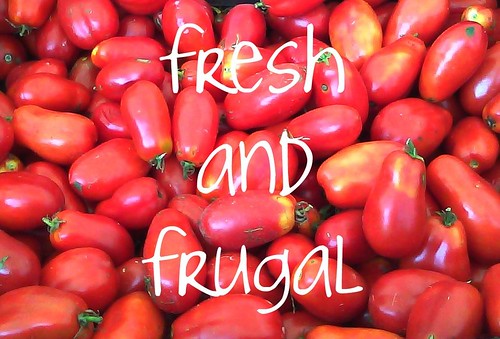
It's back to school time! We can all stand to learn a little something new, and this fall I would like to introduce a new series in the Coppertop Kitchen called Fresh and Frugal. The purpose of these posts is to share practical ways to make it easy to eat well on a budget. Eating well can be thought of from a lot of different angles, from good health and nutrition, to mindfulness about the environment, to supporting local economies. We should be able to accomplish all of this without sacrificing pleasure or breaking the bank, and that is what these posts will aim to explore. Let me know if there's a specific food or topic you'd like me to talk about!
You may have heard a story in the news over the past couple of days regarding a study that was published in the Annals of Internal Medicine, regarding the nutritional differences between organic and conventional produce. Headlines in many major news outlets said things like, "Why Organic Food May Not Be Healthier For You," (NPR) and "Organic Food Adds No Vitamins For Extra Cost" (Bloomberg Business Week). These headlines made me laugh a little to myself, and when I read the articles I was surprised that anyone would be duped into thinking they contained anything that might be thought of as "news." Most conscious consumers of organic food would tell you they were never under the impression that there were more vitamins in something just because it bears the "organic" label. And mostly, that's not the point. Organic farming practices are vastly better for the environment, using methods of fertilization and pest control that actually improve the quality of the soil, rather than dumping chemicals which run off into water sources and kill beneficial insects and bacteria. There's also the matter of pesticide residue, the effects of which we still don't know (and I'm sorry, but a two-year study is not quite long enough to convince me).
For me, "organic" is not the most important descriptor of good food. For one thing, organic certification is expensive, and many small farms that employ organic farming practices simply can't afford it. "Local" is much more important to me. I like being able to support my local economy by buying peaches from the same farmer week after week. It makes me feel connected. And get this! The produce I buy at my local farmers' market is probably more nutritious because it was more likely to have been picked when ripe, and didn't have to travel for days over thousands of miles to get to me. Something that was living on a tree yesterday and is in my belly today gives me more vitamins than something that was living on a tree a week ago, and was picked before it was ripe so that it could more easily be shipped without damage.
Other adjectives that get me excited:
- Free-Range: Meat and eggs from free-range chickens are higher in beta carotene, protein, and hello, flavor. Be careful about this label, though, and buy from a producer you know if you can. Free-range technically means that the birds have access to the outdoors, not necessarily that they go out there and get exercise and peck in the grass.
- Grass-Fed: Beef from cows that grazed on grass for all of most of their lives is leaner, higher in omega-3 fatty acids, and less likely to have been serially treated with antibiotics. It tastes different, and because it's leaner it cooks differently, but it is delicious. Dairy from pastured cows is better, too! Healthier cows produce healthier foods for us, and since cows aren't naturally adapted to eat grain (which is fed to them because it's cheaper), it makes them sick, which makes them need antibiotics. Sad cows. This is another example, though, of where the "organic" label can lead you astray. Organic milk likely just comes from cows that were fed organic grain, not allowed to graze on pasture. Read the labels!
- Wild, Line-Caught, Pole-Caught: There's fishing and then there's fishing. Farmed salmon is fed (you guessed it) grain. Because its diet is less varied and nutritious, the meat from it is less nutritious. (For more about that, read this post.) Pole- or line-caught refers to the method of catching fish; catching fish with nets is much less sustainable, and causes all kinds of problems. The Monterey Bay Aquarium publishes handy pocket guides to help you choose sustainable seafood.
- All-Natural: Oh, this one is a doozy. All this means is that nothing in it is blatantly artificial. It is not an FDA-regulated label, so pretty much anyone can put it on pretty much anything.
- Low-fat, Non-fat, Fat-free: Get with the program, people. Fat is good for you. Your body needs it. Stop buying into the outdated idea that fat causes Type 2 diabetes, obesity, heart disease, etc. The low-fat craze did absolutely nothing to curb the spread of these lifestyle diseases. Plus, whoever said that fat = flavor was right on the money.

Sounds like an awesome series! If you are interested in any guest posts, I would love to write one! Look forward to reading more!
ReplyDeleteLove this! Honestly, I'm still wading through all the food descriptors, so I'm looking forward to your thoughts. We eat a lot of fruits/veggies but I'd avoided the organic label because it seemed like a grocery market scam. I think the key is getting out of the store and to the markets/farmers/straight to the garden. Then I can really tell the difference (in taste, community, sustainability, etc). I'd love to hear your breakdown of meats, and also meal ideas that use less of it (because when I pay more for good meat, it's going to be more special). Or tell me why it's so hard to find full-fat yogurt. :D
ReplyDelete